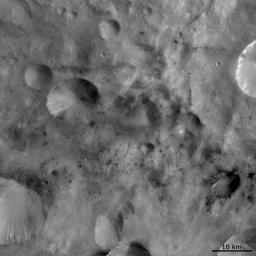This Dawn FC (framing camera) image shows areas of dark material which are both associated with impact craters and between these craters. Dark material is seen cropping out of the rims and sides of the larger craters in this image. Then it frequently slumps down towards the centers of these craters. Also, there are some small dark rayed craters such as the crater near the bottom of the right edge of the image. But, many of the spots of dark material in this image appear to not be associated with any impact craters. These spots are frequently only a few pixels across so it is possible that they are in fact associated with impact craters which are just not visible at this resolution. It will be interesting to see if such tiny impact craters become visible when Dawn reaches its higher resolution LAMO (Low Altitude Mapping Orbit) phase. There is also bright material visible in this image, most noticeably in the part of the large crater visible in the top right of the image.
This image is in Vesta's Sextilia quadrangle and the center latitude and longitude of the image is 36.6°S, 135.5°E. NASA's Dawn spacecraft obtained this image with its framing camera on October 17th 2011. This image was taken through the camera's clear filter. The distance to the surface of Vesta is 702 km and the image has a resolution of about 70 meters per pixel. This image was acquired during the HAMO (High Altitude Mapping Orbit) phase of the mission.
The Dawn mission to Vesta and Ceres is managed by NASA's Jet Propulsion Laboratory, a division of the California Institute of Technology in Pasadena, for NASA's Science Mission Directorate, Washington D.C. UCLA is responsible for overall Dawn mission science. Dawn's VIR was provided by ASI, the Italian Space Agency and is managed by INAF, Italy's National Institute for Astrophysics, in collaboration with Selex Galileo, where it was built.
More information about Dawn is online at http://www.nasa.gov/dawn and http://dawn.jpl.nasa.gov.

 Planetary Data System
Planetary Data System












